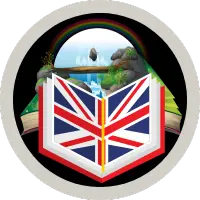A collective noun is a word that refers to a group of people, animals, or things. Imagine you were looking at a beautiful countryside scene. Instead of saying, “There were many sheep, all walking and eating together on the field,” you can say, “There was a herd of sheep in the field.”

/pɑd/
A group of marine animals, especially whales or dolphins.
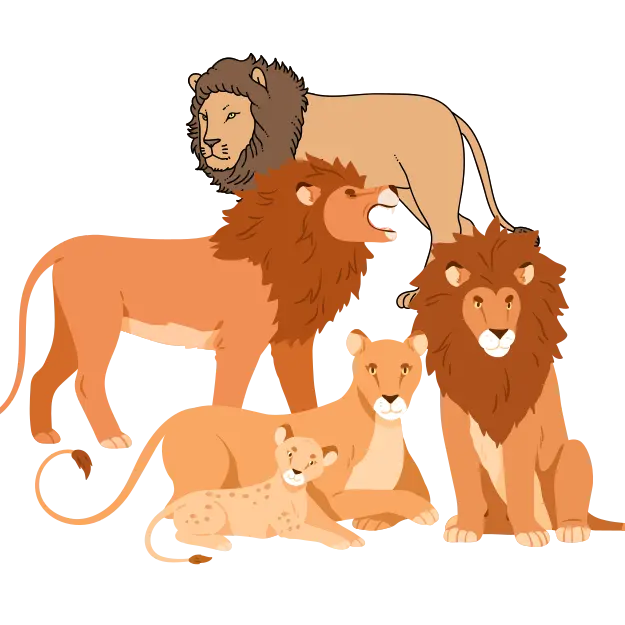
/praɪd/
A group of lions.
In American English, collective nouns are treated as singular. In British English, they can either be singular or plural depending on the context.
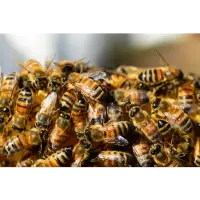
/swɔrm/
A large group of insects, especially flying ones.
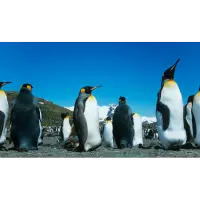
/ˈkɑl.ə.ni/
A group of certain animals, especially ants or seabirds, that live together.
Some collective nouns for animals are also used to describe people in a negative way. For example, calling a group of people a “herd” suggests that they are following others without thinking.
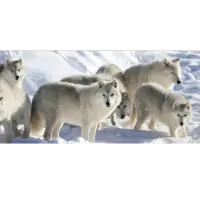
/pæk/
A group of wild animals, especially wolves, living and hunting together.
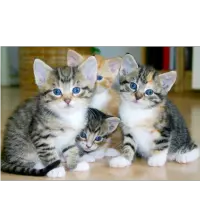
/ˈlɪt.ər/
A group of young animals born together by the same mother.
When was the last time you came across a group of animals? If you see one again, call it by its collective noun.
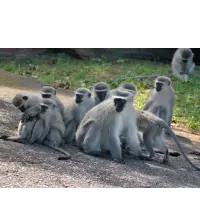
/trup/
A group of monkeys.
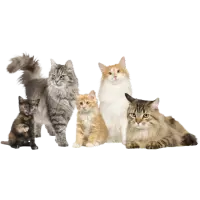
/ˈklaʊ.dər/
A group of cats.
Some collective nouns can be used in many different situations. For example, the word "pack" can describe a group of animals (a pack of wolves), a group of people (a pack of thieves), objects (a pack of cards), or even abstract things (a pack of lies).
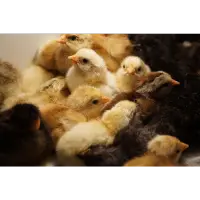
/brud/
A group of young birds hatched at the same time.
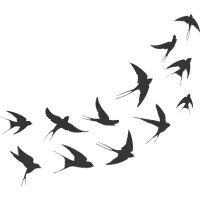
/flaɪt/
A group of flying birds.
Some collective nouns can only be applied to specific groups. For instance, “a pride” refers only to lions, not to other animals.
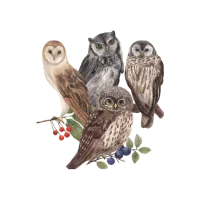
/ˈpɑːrləmənt/
A group of owls.
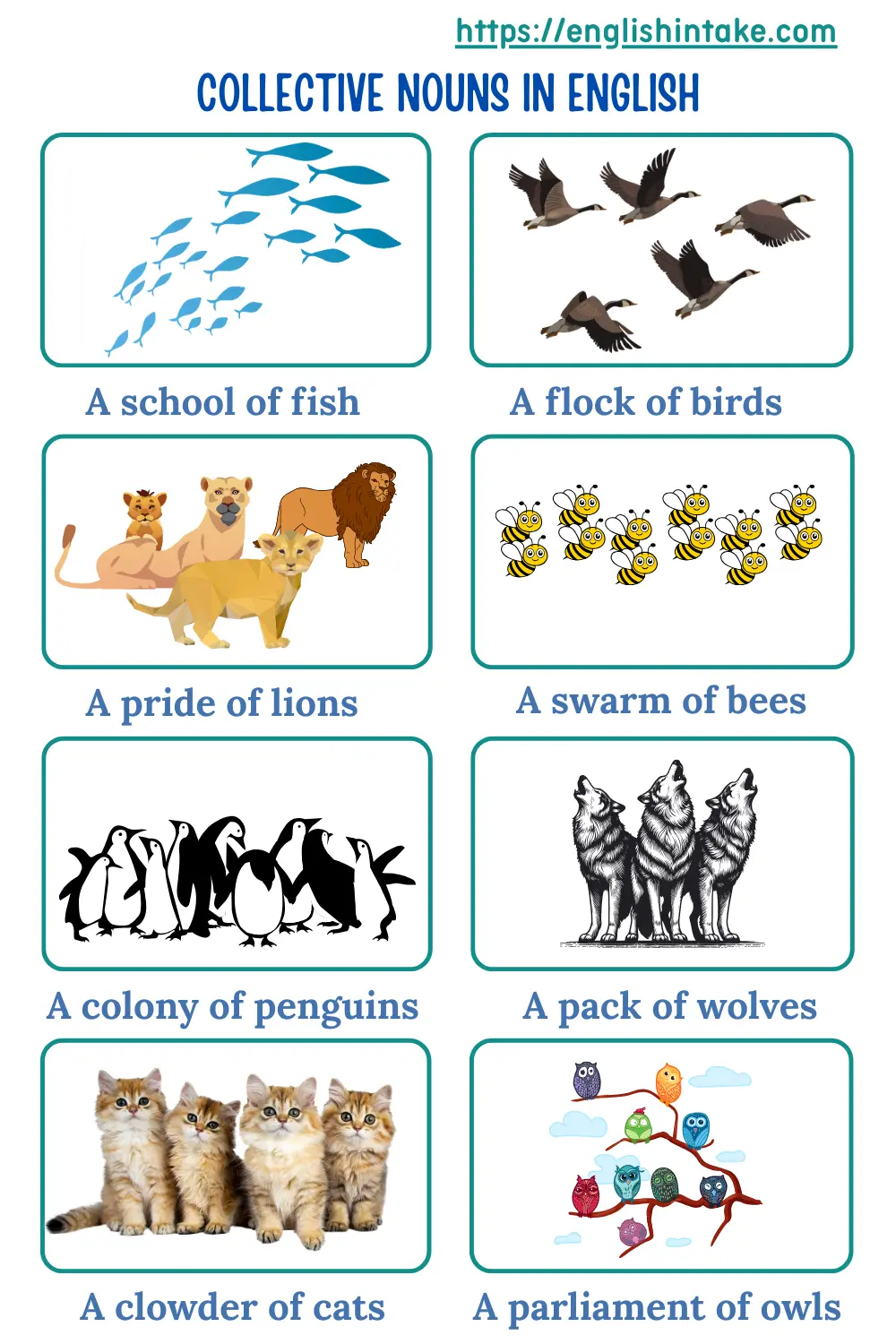
2.2 What do you call a group of penguins?
2.2.1 Penguins on land
When penguins gather on land, they usually move in groups that highlight their distinctive, waddling walk.
- Waddle: A waddle of penguins is used to describe penguins moving on land, especially with their side-to-side gait.
- Huddle: A huddle of penguins refers to groups gathered closely together, often to keep warm in colder climates.
- Colony: A colony of penguins describes a larger group living and nesting together on land.
- Rookery: A rookery is a breeding colony where penguins nest, lay eggs, and raise chicks.
2.2.2 Penguins in water
Penguins are social and often remain in groups while in water. The terms used here describe their aquatic behaviour.
- Raft: A raft of penguins describes a group swimming or floating together on the water's surface.
2.2.3 Names for a group of penguins in general
Some collective nouns apply to penguins in both land and water settings, emphasising their social nature.
- Group: A group of penguins is a broad term for penguins in various settings.
- Flock: Though more common for flying birds, a flock can describe penguins as a collective.
2.3 Collective nouns for bees
2.3.1 Bees in large groups or colonies
Bees are social insects and often form large groups with highly organised structures. Here are some common terms for groups of bees:
- Swarm: A swarm of bees refers to a large group of bees moving together, often when they leave their hive to start a new colony.
- Colony: A colony of bees describes an organised community living and working together in a hive.
- Hive: A hive of bees refers to the structured group of bees living in a man-made or natural beehive.
- Nest: A nest of bees can describe bees living in a natural shelter, such as a hollow tree.
2.3.2 Bees with specific roles
In a bee colony, different terms are used to describe bees based on their roles and functions:
- Brood: The brood consists of young bees, including eggs, larvae, and pupae, being cared for by worker bees.
- Cluster: A cluster of bees can refer to a tight group of bees, especially when they gather together for warmth in cold weather.
2.3.3 Common names for groups of bees
Some terms apply to groups of bees regardless of their specific behaviour or structure:
- Flight: A flight of bees can describe bees flying together, especially when they are gathering nectar or returning to the hive.
- Bike: A less common collective noun for bees, a bike of bees, also refers to a group of bees.
3. Group names we use for people
It is common for people to come together in groups for work, play, or chat. We have collective nouns for these groups. Below is a list of collective nouns for people with their definitions and example uses.

/'ɔː.di.əns/
A group of people watching or listening to something or someone.

/bɔrd/
A group of individuals that manage or control an organisation.
The word colony can be applied to a group of people, animals, or plants. You can use it to describe animals of the same type that live together (a colony of ants, a colony of bats, a colony of bacteria). You can also use it to refer to a group of people who share a common lifestyle, job, or passion and choose to live together, usually apart from the rest of society (a nudist colony).

/kru/
People working together, especially on a ship, aircraft, or film.
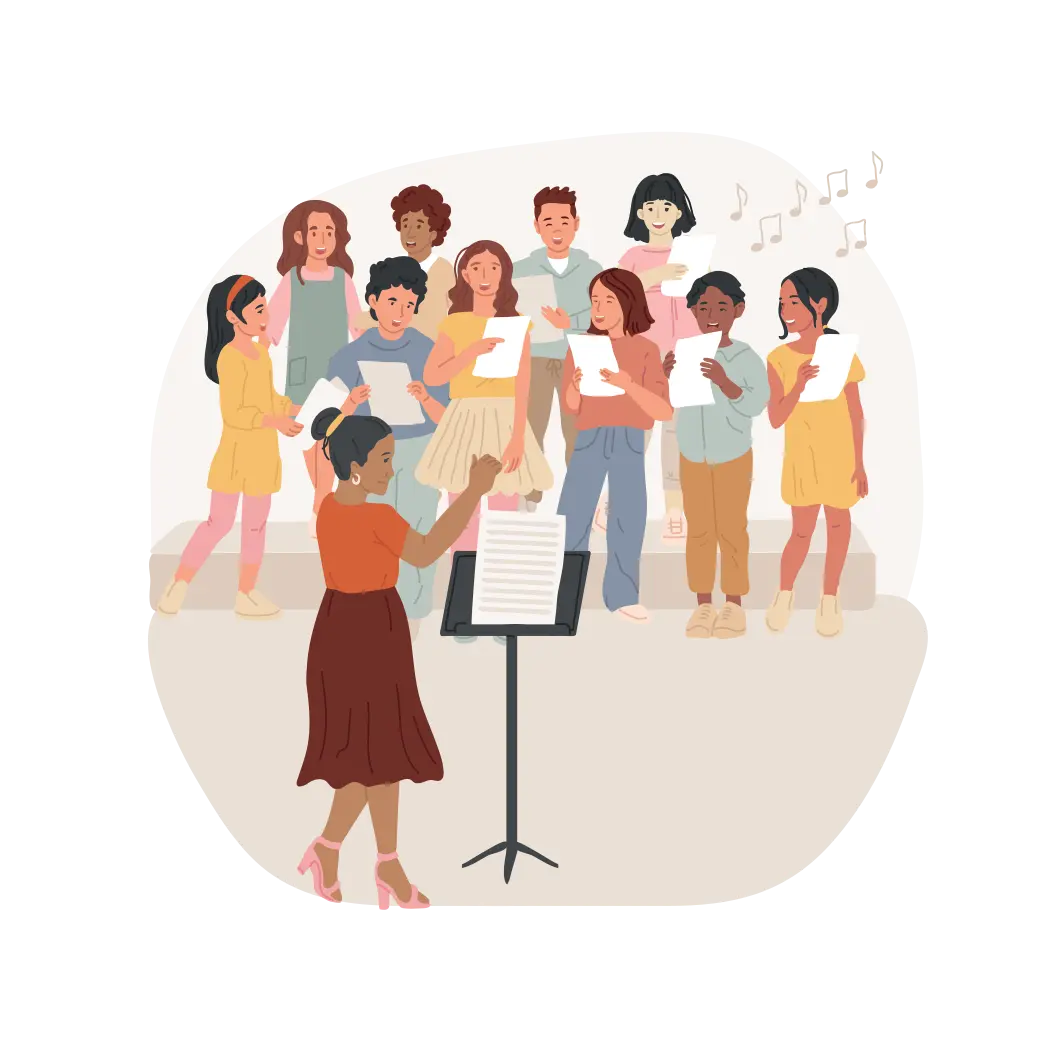
/kwaɪər/
A group of people who sing together.
You can use the word array to describe a group of things or people, especially one that has been arranged or positioned in a way that causes admiration.
- Donald Trump organised the first military parade in the US Capitol since 1991. It featured an array of soldiers, tanks, fireworks, helicopters, etc.
- Particles in the ionosphere can produce a spectacular array of colours when they collide with gases like oxygen and nitrogen.

/klæs/
A group of students who are taught together.
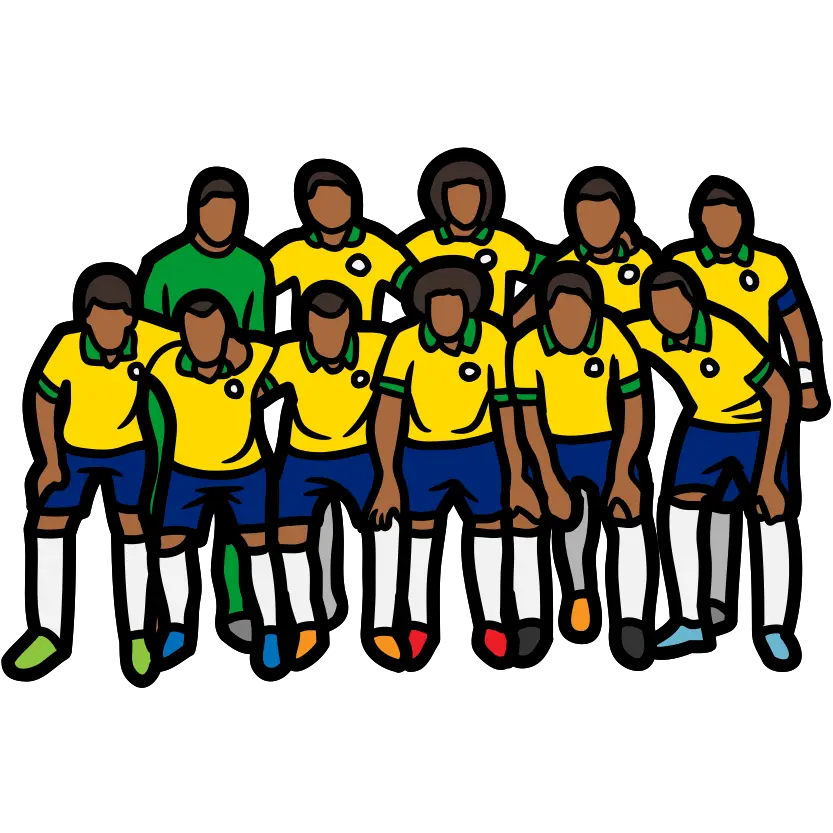
/tim/
People who play together in a sports game or work together on a particular project.
You can describe a people of a particular type using the word "flock".
- Luke 12:32 – “Do not be afraid, little flock, for your Father has been pleased to give you the kingdom.”
- Every spring, a flock of tourists comes here to meditate.

/ˈpæn.əl/
A group of experts or individuals gathered to discuss, judge, or advise on a particular subject or issue.

/trup/
A group of scouts or soldiers.
A bunch can refer to people and things.
- I need to buy a bunch of flowers for the funeral.
- They’re just a bunch of stupid guys.
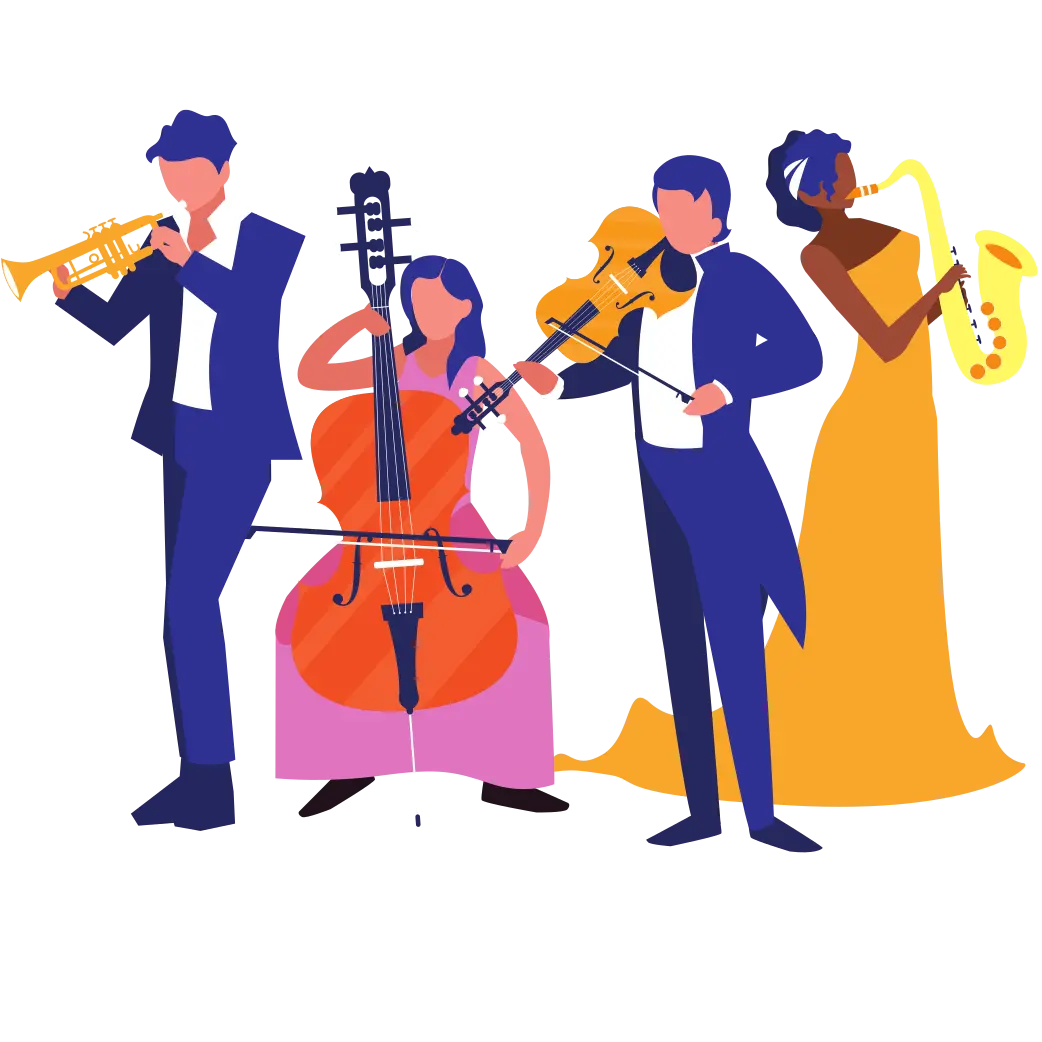
/ˈɔːrkɪstrə/
A group of musicians who play many different instruments together.

/kæst/
All the actors in a film, play, or show.
A batch can describe people and things.
- I was among the first batch of students from my country to be awarded a PhD in Astronomy in 2014.
- When I was a child, my mom used to make a batch of cookies on Sundays.

/ˈfæk.əl.ti/
All the teachers or lecturers of a particular school, college, or university.
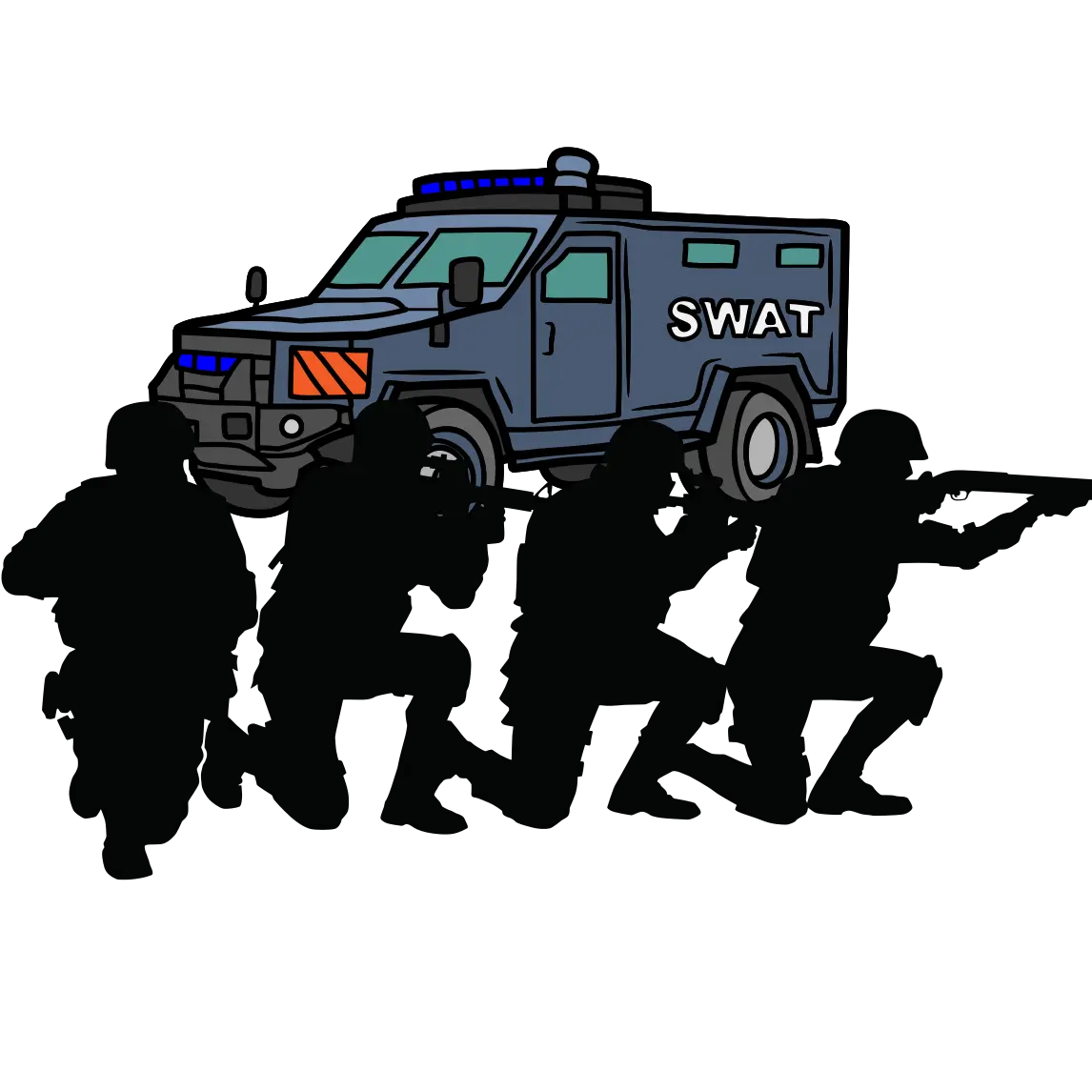
/skwɑd/
A small group of people trained to work together as a unit.
You can use a band to describe a group of people who have a shared goal or activity.
- This neighbourhood has become home to a band of outlaws.
- The King of Ammon joined forces with a band of rebels to kill Gedaliah.
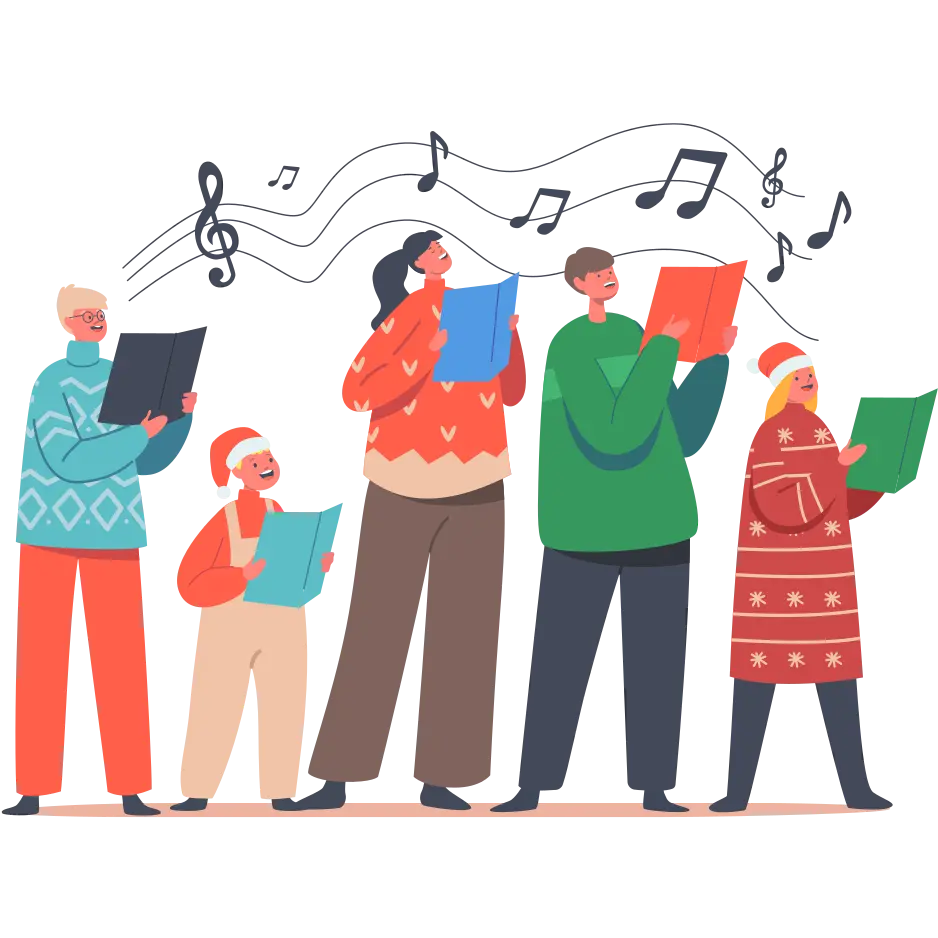
/ˈkɔːrəs/
A group of people singing together.

/mɒb/
A large crowd or group of people.
4. English terms for groups of objects
In English, there are also collective nouns to indicate groups of things. Instead of saying many paintings, we can say a gallery of paintings. Familiarise yourself with these collective nouns to make your English more elegant.
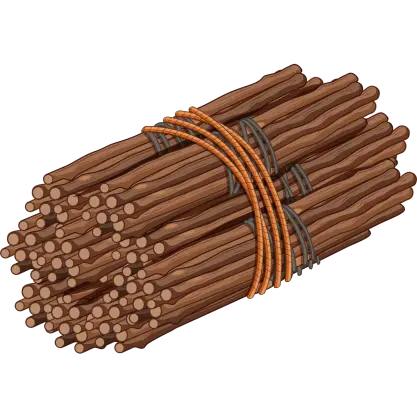
/ˈbʌn.dəl/
A collection of things wrapped up together.
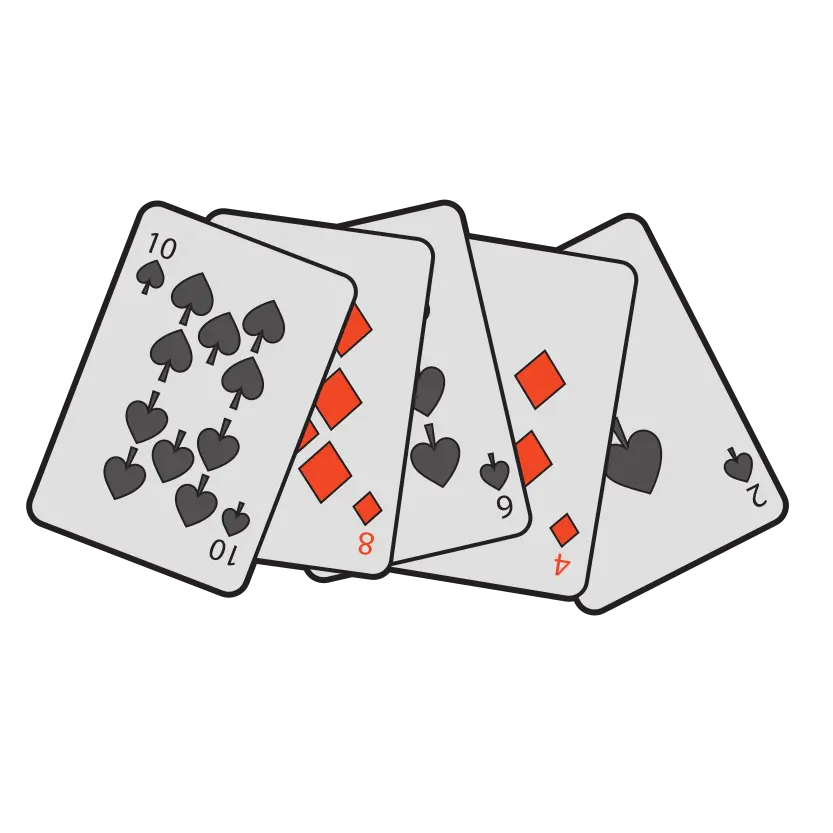
/dɛk/
A set of cards.
You can use a string of to describe something arranged one after another, usually threaded together.
- My boyfriend gave me a beautiful string of pearls.
- Did she like the string of beads I gave her?
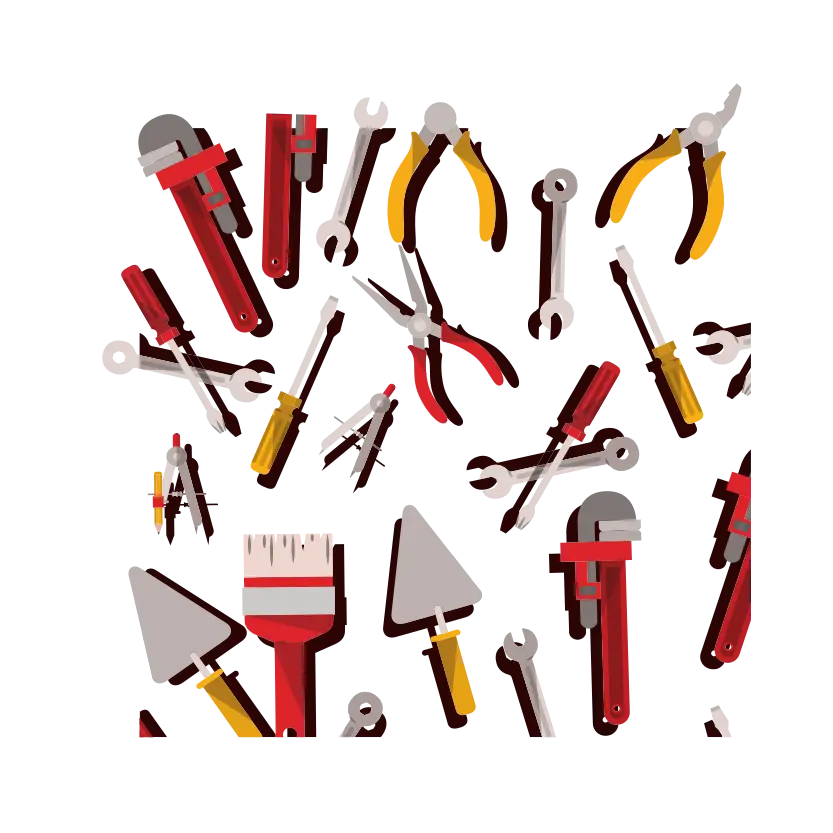
/sɛt/
A group of things that belong together, or resemble one another in some way.

/stæk/
A pile of things arranged one on top of another.
To describe several things of a similar type, you can use the word "a battery of".
- We need to put a battery of artillery here.
- You will be given a battery of tools to use during your training.
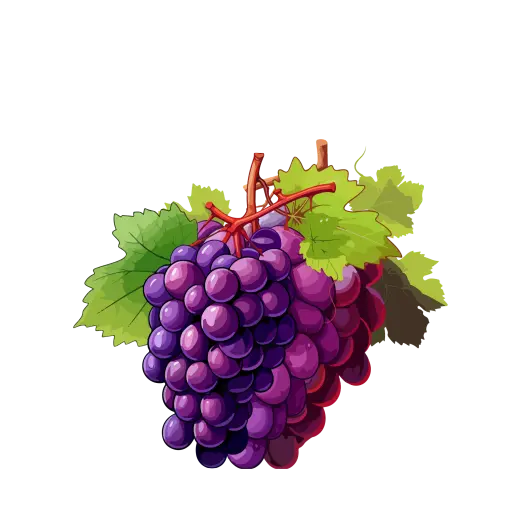
/bʌntʃ/
Several things, typically of the same kind, fastened or packed together.

/ˈlaɪ.brer.i/
A collection of books or music.
A clutch of can be used for people and things. You can use it to describe a group of eggs laid by the same bird.
- I found a clutch of eggs in the garden.
- It’s by far the best clutch of students I’ve ever had.
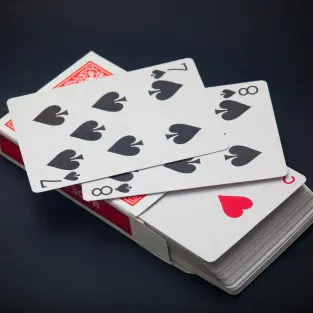
/pæk/
A collection of things wrapped or boxed together.

/bætʃ/
A quantity of goods produced at the same time.
A pile of describes something arranged on top of each other. It also means "a lot of something".
- I have a pile of emails to read.
- I found an interesting diary under a pile of books while I was looking for my student card.

/fliːt/
A group of ships sailing together.

/laɪn/
A row of people or things arranged next to each other.
A galaxy of can be used to refer to a group of stars or the gathering of celebrities.
- There’s a beautiful galaxy of stars outside.
- A galaxy of Hollywood stars attended Jeff Bezos’ wedding in Venice.
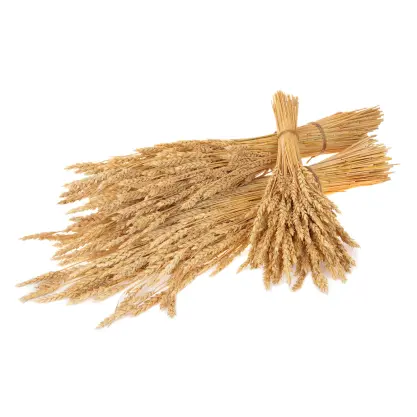
/ʃiːf/
A collection of things held or tied together.

/riːm/
A packet of 500 sheets of paper.
I hope you like this vocabulary lesson. I have included many example sentences and pictures to help you memorise them. Try to use the words you have learned in your daily conversation.

/wɒd/
A thick pile of flat material or banknotes.

/ˈklʌs.tər/
A group of similar things that are close together, sometimes surrounding something.
5. Group names for various categories of nouns
| Categories | Animals/objects/people | Collective nouns |
|---|---|---|
| Birds | Penguins | Colony, rookery, waddle (on land), raft (in water) |
| Owls | Parliament | |
| Flamingos | Stand, colony, flamboyance | |
| Crows | Murder | |
| Geese | Gaggle (on land), skein (in flight) | |
| Parrots | Pandemonium | |
| Sparrows | Host | |
| Starlings | Murmuration | |
| Ravens | Unkindness, conspiracy | |
| Peacocks | Ostentation, muster | |
| Mammals | Elephants | Herd, parade |
| Wolves | Pack, rout | |
| Whales | Pod, gam, school | |
| Lions | Pride | |
| Monkeys | Troop, barrel | |
| Kangaroos | Mob, troop | |
| Leopards | Leap | |
| Giraffes | Tower | |
| Bears | Sloth, sleuth | |
| Horses | Team, harras | |
| Cats | Clowder, pounce | |
| Rabbits | Colony, fluffle, nest | |
| Dogs | Pack, kennel | |
| Cattle | Herd, drove | |
| Fish and sea creatures | Fish | School, shoal |
| Jellyfish | Smack, bloom | |
| Dolphins | Pod, team, school | |
| Sharks | Shiver | |
| Clams | Bed | |
| Trout | Hover | |
| Lobsters | Risk | |
| Oysters | Bed | |
| Eels | Swarm | |
| Insects and small creatures | Ants | Colony, army |
| Bees | Swarm, hive, grist | |
| Butterflies | Kaleidoscope, flutter | |
| Flies | Business | |
| Locusts | Plague | |
| Grasshoppers | Cloud | |
| Spiders | Cluster, clutter | |
| Wasps | Swarm, nest | |
| Snails | Escargatoire, rout | |
| Reptiles and amphibians | Frogs | Army, knot |
| Toads | Knot | |
| Snakes | Den, pit, nest | |
| Lizards | Lounge | |
| Alligators | Congregation | |
| Turtles | Bale, nest | |
| Crocodiles | Bask | |
| Objects and things | Keys | Bunch |
| Ships | Fleet | |
| Flowers | Bouquet | |
| Mountains | Range | |
| Islands | Archipelago | |
| Stars | Constellation | |
| Clouds | Cluster | |
| Trees | Grove | |
| People | Musicians | Band |
| Soldiers | Army, troop | |
| Actors | Cast | |
| Judges | Panel | |
| Chefs | Brigade | |
| Policemen | Squad | |
| Students | Class | |
| Friends | Circle | |
| Teachers | Faculty | |
| Dancers | Troupe | |
| Employees | Staff |
If you are ready to do some practice, check my collective nouns exercises.
